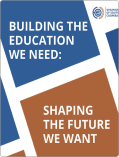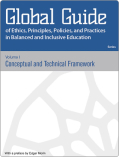Transdisciplinarity
An integrative multi-perspective approach based upon interconnecting both academic as well as non-academic knowledge domains for a complex and holistic understanding of the world.
In Rethinking Education: Towards a global common good?, published by UNESCO in 201582, the purpose of education in the 21st century is set out to be inextricable from the global challenges which we face and the imperative to transform our societies to achieve sustainable development:
“The purpose of education must therefore be revisited in light of a renewed vision of sustainable human and social development that is both equitable and viable. This vision of sustainability must take into consideration the social, environmental and economic dimensions of human development and the various ways in which these relate to education: ‘An empowering education is one that builds the human resources we need to be productive, to continue to learn, to solve problems, to be creative, and to live together and with nature in peace and harmony. When nations ensure that such an education is accessible to all throughout their lives, a quiet revolution is set in motion: education becomes the engine of sustainable development and the key to a better world.’ Education can, and must, contribute to a new vision of sustainable global development.”
The roots of the modern education system are of particular importance. Conceived within the context of the industrial revolution, with the establishment of compulsory schooling laws throughout the 19th century:
“Mass education was the ingenious machine constructed by industrialism to produce the kind of adults it needed. […] The solution was an educational system that, in its very structure, simulated this new world. This system did not emerge instantly. Even today it retains throw-back elements from pre-industrial society. […] The whole administrative hierarchy of education, as it grew up, followed the model of industrial bureaucracy. The very organization of knowledge into permanent disciplines was grounded on industrial assumptions. […] The inner life of the school thus became an anticipatory mirror, a perfect introduction to industrial society.”
This legacy must be addressed if education is to be repurposed to serve sustainable development and a humanistic vision of the future. As identified by A. Toffler, one such legacy is the organisation of knowledge into permanent, segregated disciplines –mathematics, philosophy, history, biology, physics, literature… The global challenges which face the world in 21st century, from climate change to persisting poverty, cannot be addressed by mono-disciplinary means, for “all the great themes are polydisciplinary” in their nature. The disciplinary form of education within the context of the imperative that is sustainable development, therefore, is itself unsustainable.
It is through this rationale that transdiscplinarity as an approach to education emerges as a necessity for sustainable development. The disciplinary approach to education is one which is effective in producing hyper-specialisation, but the cost of this efficiency is a form of blind intelligence, incapable of integrating knowledge domains in a coherent whole.86 This approach is not, however, to be mistaken as anti-disciplinary nor reduced to inter-disciplinarity. It is, rather, an organisation and production of knowledge between, across, and beyond disciplines, providing a framework in which the “potential to make knowledge produced increasingly relevant to analysing pressing global challenges”.
With the ongoing development of the contemporary technological revolution, the world is undergoing unprecedented transformation. This has led numerous stakeholders, across sectors, to announce the emergence, if not already underway, of a 4th Industrial Revolution. It has three, distinctive characteristics:
-
1VelocityContrary to the previous industrial revolutions, this one is evolving at an exponential rather than linear pace. This is the result of the multifaceted, deeply interconnected world we live in and the fact that new technology begets newer and ever more capable technology.
-
2Breadth and depthIt builds on the digital revolution and combines multiple technologies that are leading to unprecedented paradigm shifts in the economy, business, society, and individually. It is not only changing the “what” and the “how” of doing things but also “who” we are.
-
3Systems ImpactIt involves the transformation of entire systems, across (and within) countries, companies, industries and society as a whole.
The world would be –and, to a large extent, already is– overhauled and shaped, therefore, by disruptive forces, which will radically transform not only our ways of life, but also our very beings. Assuming that the 4th Industrial Revolution will not be hindered, education systems will now, in effect, be required to develop:
The capacity for complex analysis and solutions; for instance:
The rise and spread of Autonomous Artificial Intelligence (AI) systems, with the risk of perverse instantiation90, morphs certain philosophical dilemmas which had, until now, been considered to be mere thought experiments into imminent realities to be resolved. The case of self-driving cars is particularly pithy: Artificial Intelligence notwithstanding, under the bonnet of self-driving cars nonetheless lies complex programming from human programmers. Although much of the rationale behind self-driving cars is the reduction of accidents, these programmers have to provide instructions to the self-driving car for the inevitable, even if rare, car accident. The consensus, there, seems to programme the car so as to minimise casualties –namely, if a self-driving bus and a self-driving car were to collide, the self-driving car would, should the need arise, be sacrificed. Prima facie, this seems sensible. But as the trolley problem, first articulated by Philippa Foot but then countlessly retaken and revised, demonstrates, the principle may prove to be more difficult to articulate than at first thought. This is a minute, yet concrete example where disciplines, which are currently segregated in contemporary education, converge in a complex reality, requiring a transdisciplinary approach.
Preparedness for the disruptive forces and transformations shaping the future; for instance:
In the case of self-driving cars, should this innovation come to realisation, it is to be expected that numerous industries would disappear or be completely transformed, with their own sets of consequences from taxi-chauffeur services to insurance, passing by the law (who is held to account for an accident by a self-driving car and who is at fault?)
In the case of Artificial Intelligence more generally, not only would many predictable careers disappear or require so great a modification that they would, in effect, be entirely different careers, but also many career prospects that we would assume to be desirable in such a future may, in fact, be rendered obsolete –it is noteworthy that the primitive, basic foundations for Artificial Intelligence to be capable of writing programmes itself already exist.
Both requirements make the need for a transdisciplinary education become all the more urgent. The first requirement can, once again, only be addressed by an approach which is capable of perceiving and engaging with the world and reality in their globality and complexity, including uncertainty, and comprehending the perpetual nature of inter-retroactivity. The second requirement further emphasises the importance of transdisciplinary education, as it is not merely a more comprehensive transmission of information and knowledge. It is, more importantly, the development of a transdisciplinary mindset, a complex thought capable of drawing connections between academic and non-academic knowledge domains in relation to a complex and, perhaps, complexifying world. This is particularly fundamental to any education for the future, as education systems have historically and inevitably been deficient in predicting and preparing for the transformations of the labour market, perpetually seeking to catch up with such change. In other words, in addition to enabling the analysis of the world in all its complexity and the ramifications of perpetuall inter-retroactivity, a transdisciplinary education does not attempt a vain chase after an ever-accelerating transformation of the world but, rather, enables and develops intrinsic skill of adaptability.
Pluri-disciplinarity: Education is conceived by specialists in education, and consists of different subjects taught side-by-side in different classes.
Interdisciplinarity: Education is conceived together by diverse disciplinary specialists. Educational curricula attempt to overcome barriers between subjects.
Transdisciplinarity: Education is conceived both by specialists and non-specialists. Curricula reflect the social needs and aspirations relevant to educational attainment, going beyond the limitations of academic disciplines.
It is crucial to reiterate that a transdisciplinary education is not anti-disciplinary. Its approach of producing knowledge between, across and beyond disciplines implies the existence and the requirement of disciplines, as well as non-academic knowledge domains. Disciplines will continue to exist –it is the approach to them that must change.
Four Pillars
of
Balanced and Inclusive
Education (BIE)
Approach based upon enhancing the understanding of inter-indebtedness and interdependence of cultures
Integrative multi-perspective approach based upon inter- connecting both academic as well as non-academic know-ledge domains
Interactional and synergetic approach based upon problem-posing dialogue and critical exchange through the proactive participation of learners
Context-centred approach based upon the integration and adaption to the realities, values, and interpretive frameworks of the learners, to develop their sense of co-ownership and co-creation




